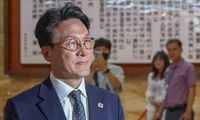On July 3, 2025, South Korea's National Assembly passed the appointment motion for Kim Min-seok, the nominee for Prime Minister designated by President Lee Jae-myung, marking a significant milestone for the newly inaugurated government. The motion was approved with a commanding 173 votes in favor, 3 against, and 3 abstentions out of 179 lawmakers present, despite the absence of the opposition People Power Party, who boycotted the vote in protest.
Kim Min-seok's nomination has been a subject of intense debate and controversy since President Lee announced his candidacy on June 4, 2025, the very day of his inauguration. The National Assembly received the official nomination request on June 10, and after nearly a month of scrutiny, including confirmation hearings held on June 24 and 25, the assembly finally moved to confirm him as the 49th Prime Minister and the first to serve under the Lee administration.
The confirmation hearings themselves were fraught with tension, as the People Power Party raised concerns about Kim's personal finances, specifically allegations related to private debts and questionable celebratory donations connected to his book launches and wedding ceremonies. These unresolved suspicions fueled the opposition's call for Kim's resignation and led to their decision to abstain from the final vote, staging protests and a lawmakers' assembly outside the plenary hall.
Despite the opposition's resistance, the ruling Democratic Party pushed forward with the vote, emphasizing the urgent need for stable leadership. Woo Won-shik, the National Assembly Speaker, underscored the necessity of moving ahead, stating, "We cannot delay any longer. It has been 30 days since the new government was launched today. There has been no case in democratic history where the first Prime Minister of a new government failed to start their term even a month after its launch." He added that normalizing the government structure was imperative, noting, "It is now necessary to normalize the system of acting Prime Minister, which has been unavoidably prolonged due to the emergency situation."
Kim Min-seok, a four-term lawmaker from the Democratic Party and a close aide to President Lee, has been an active figure in public life even before his official confirmation. Throughout the nomination process, he engaged in various public activities, including receiving briefings on economic and social affairs, signaling his readiness to assume the prime ministerial role amid the country's pressing challenges.
Following the successful vote, President Lee swiftly re-approved Kim’s appointment later that day at 5:36 PM, confirming his role as the new Prime Minister. Kim immediately addressed the media at the National Assembly, expressing his gratitude and outlining his priorities: "I will accept the will of the people as heaven and resolve the direction of the President from the ground up, incorporating the wisdom of the lawmakers beyond the ruling and opposition parties." He highlighted overcoming the economic crisis as his foremost task, stating, "Overcoming the economic crisis filled with explosive power is the No. 1 task." Moreover, he pledged to be a "morning Prime Minister" who thinks ahead and takes initiative, aligning closely with President Lee's vision.
Kim’s commitment to tackling the economic crisis echoes his earlier remarks on June 5, shortly after his nomination, when he declared his intention to shoulder the responsibilities of safeguarding people's livelihoods and fostering national unity amidst what he described as a difficult situation akin to a second IMF crisis.
The opposition's boycott and protests underscored the deep political divisions surrounding Kim's appointment. The People Power Party criticized the ruling party's unilateral action as "dictatorship ignoring the people" and accused Kim of failing to clarify allegations of illegality and impropriety. Lee Jong-bae, a People Power Party lawmaker and former chairman of the confirmation hearing committee, went as far as to label Kim "the first brazen Prime Minister" for allegedly disregarding the National Assembly and acting prematurely in his role.
Nonetheless, the ruling party and government officials remain optimistic about the appointment's implications. Woo Sang-ho, Chief of Staff to the President, remarked that the swift confirmation was fortunate for the early stages of the administration and anticipated that Kim would immediately address pressing national issues without disruption.
Kim Min-seok is scheduled to begin his official duties promptly, starting with a visit to the National Cemetery on July 4, signaling his respect for national heritage and commitment to public service. As the first Prime Minister of the Lee Jae-myung government, Kim faces the dual challenges of steering economic recovery and promoting political integration in a polarized environment.
When questioned about how he plans to engage with the opposition, especially given their persistent opposition to his appointment, Kim chose not to respond and promptly left the venue, reflecting the delicate political climate he must navigate.
This appointment marks a pivotal moment in South Korea’s political landscape, as the Lee administration seeks to stabilize governance and implement its agenda amid economic uncertainties and partisan tensions. Kim Min-seok's tenure will be closely watched as a test of the new government's ability to lead effectively and unify the nation.


